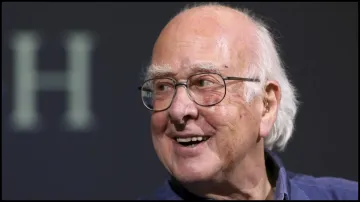London: Nobel prize-winning physicist Peter Higgs, who proposed the existence of the Higgs Boson particle, also known as the 'God Particle', has died at age 94, the University of Edinburgh said on Tuesday. Higgs proposed the existence of the Higgs Boson in 1964, but the particle's existence could be confirmed at the Large Hadron Collider almost 50 years later.
The university, where Higgs was emeritus professor, said he died Monday “peacefully at home following a short illness". Higgs won the 2013 Nobel Prize in Physics for his work, alongside Francois Englert of Belgium. His theory related to how subatomic particles that are the building blocks of matter get their mass and is a central part of the Standard Model of physics that describes how the world is constructed.
Edinburgh University Vice Chancellor Peter Mathieson said Higgs, who was born in the Scottish capital, was “a remarkable individual – a truly gifted scientist whose vision and imagination have enriched our knowledge of the world that surrounds us". "His pioneering work has motivated thousands of scientists, and his legacy will continue to inspire many more for generations to come," he added.
Dr. Higgs was 35 and an assistant professor at the university in 1964 when he suggested the existence of a new particle that would explain how other particles acquire mass, according to the New York Times. After the particular was discovered in existence, Higgs received a standing ovation at the European Organization for Nuclear Research, or CERN, in Geneva where he was told that his particle had finally been found.
His theory suggested the existence of an invisible force field and associated subatomic particles permeating all things, working like glue to give form to stars, planets and even humans. Without the particle, the universe would have remained like a soup, according to the theory.
“It’s really an incredible thing that it’s happened in my lifetime,” he said on the webcast. The “God particle” was a term used in Nobel-winning US physicist Leon Lederman’s book of the same name to describe the boson field’s qualities. The particle is said to offer data into dark matter and dark energy, which make up more than 90 per cent of the universe.
A member of the Royal Society and a Companion of Honour, Higgs spent the bulk of his professional life at Edinburgh University, which set up the Higgs Centre for theoretical physics in his honour in 2012. His wife Jody, a linguistics lecturer from whom he was separated, died in 2008. He has two sons, Chris and Jonny, his daughter-in-law Suzanne and two grandchildren, according to The Guardian.
Fabiola Gianotti, the director general at Cern and former leader of the Atlas experiment, which helped discover the Higgs particle in 2012, said: “Besides his outstanding contributions to particle physics, Peter was a very special person, a man of rare modesty, a great teacher and someone who explained physics in a very simple and profound way.
(With AP inputs)
Latest World News
